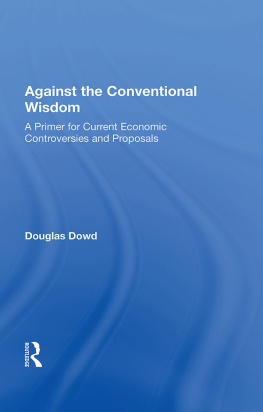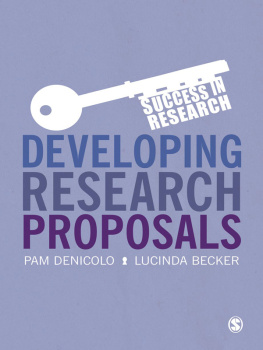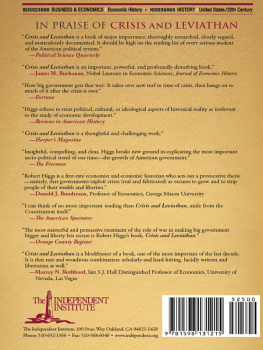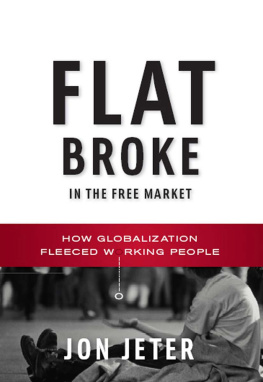First published 1997 by Westview Press
Published 2018 by Routledge
52 Vanderbilt Avenue, New York, NY 10017
2 Park Square, Milton Park, Abingdon, Oxon OX14 4RN
Routledge is an imprint of the Taylor & Francis Group, an informa business
Copyright 1997 by Taylor & Francis
All rights reserved. No part of this book may be reprinted or reproduced or utilised in any form or by any electronic, mechanical, or other means, now known or hereafter invented, including photocopying and recording, or in any information storage or retrieval system, without permission in writing fromthe publishers.
Notice:
Product or corporate names may be trademarks or registered trademarks, and are used only for identification and explanation without intent to infringe.
Library of Congress Cataloging-in-Publication Data
Dowd, Douglas Fitzgerald, 1919-
Against the conventional wisdom : a primer for current economic
controversies and proposals / Douglas Dowd.
p. cm.
Includes bibliographical references (p.) and index.
ISBN 0-8133-2795-4 (hc.)ISBN 0-8133-2796-2 (pbk.)
1. United StatesEconomic policy1981-1993. 2. United States
Economic policy1993- 3. Free enterpriseUnited States.
4. Radical economics. I. Title.
HC106.8.D68 1997
338.973dc21
97-11797
CIP
ISBN 13: 978-0-367-01029-4 (hbk)
The continuous rightward drift of socioeconomic policies in the United States has appalled a goodly share of our people. That drift has been facilitated by an onslaught of supporting arguments almost totalitarian in their force and scope. Moreover, those enabling ideas are as meretricious as the policies they seek to justify are odious. The consequence, nevertheless, is that the opposition has been rendered scattered, muted, feckless.
The unifying core of this stampeding political economy is its born-again deification of the free market. Acceptance of that position makes it difficult to undo the economic policies already savaging our society and to oppose still others under consideration. It is clearly essential to analyze and to rebut the conservative-to-hard-right economic arguments propping up these trends in thought and public policy. It is vital to show that what has become common sense for so many is not good senseeconomically or sociallynow or later, is neither necessary nor desirable, and will deepen existing troubles, not resolve them.
This book seeks to explain and expand upon the foregoing assertions and, if it does so successfully, to revive the confidence and energies of those who would reverse the present course. That course, more likely than not, will take us to disasters worse than those already afflicting us and others.
The first three chapters explore the reasoning and the realities of the free market ideology as it originally developed and now functions. Succeeding chapters treat in more detail the human, social, and natural consequences over time of rule by the market and in that light examine recently adopted proposals of Congress and the White House as well as some being discussed.
There are alternatives to current tendencies that are simultaneously desirable, necessary, and realistic. The book will conclude with a brief discussion of some of those alternatives, with broad suggestions for meeting our needs and achieving our potentials in more hopeful ways.
The numerous notes are meant to document and to elaborate upon various ideas put forth in the text; they are also meant to be a guide to further reading. A belief in democracy has always carried with it the implicit and accompanying requirement of an informed public. The necessary information and understanding can be found in a multiplicity of ways; indispensable among them is readingand reading, and reading, and reading. That need rises as the habit of reading declines; this book hopes to be a small contribution toward an opposite tendency.
Finally, and with much pleasure, I wish to express my thanks to those who in various ways played an important role in bringing this work into existence. First, to the students in my three classes in the San Francisco Bay Area (Berkeley, Petaluma, and San Francisco). The classes have been conducted on and off for more than twenty years; they take place in bookstores, not universities, involve no exchange of money or grades, and their students range in age from twenty to eighty; normally we meet about ten times for two hours a session. The recent class that led to this book was called Getting Our Heads Screwed on Straight on Current Economic Controversiesa title considered unseemly in the publishing world. I enjoyed and learned much from teaching that class.
Once that writing had become a first draft, Barbara Ellington, who had ushered a previous book of mine to publication, persuaded Westview Press to accept it. And then, much to my gratification, Marian Safran, the copy editor of that earlier book, worked on this one. Readers can never know how much is owed to the copy editor, for they rarely if ever see the manuscript whose breaches of grammar, style, and clarity have been dealt within this case, handily and gracefully. Overseeing the project from start to finish, Melanie Stafford was an astute facilitator, for which I thank her.
And I offer a special thanks to my good friend Howard Zinn, who helped much and in various ways. Then, as always, and always more, I thank Anna, for what she has meant to this book and to my life.
Douglas Dowd
Myths and Realities of the Free Market
Markets are useful guides for certain purposes. But as economist Samuel Bowles has warned, Markets not only allocate resources and distribute income, they also shape our culture, foster or thwart desirable forms of human development, and support a well defined structure of power. Markets are as much political and cultural institutions as they are economic.
The marketability of everythingthe aim of free market guru Milton Friedman and his numerous followersmeans the commodification of everything. Commodification has been and will remain lethal for a goodly number of vital economic and social processes, the very processes that do so much to determine the quality of our existence, those that involve health, education, and the preservation of natural resources. The need is great to disentangle what is valuable from what is harmful in the operation of free markets, to extract what can be a useful guide to economic policy from what has now become an indiscriminate endorsement of the market.
The spuriousness of todays free market dogma is quickly exposed if, in response to the command to listen to the market, one asks which market? Only rarely is there a hint of what would almost always be the accurate answer: the financial marketand there is more than one. Even if that is made clear, however, scarcely ever is it also acknowledged that the financial sector is dominated, not by the servicing of productive investment that has provided its reputability, but by speculation in securities and in the foreign exchange market (the latter exceeding $2.6 trillion per day )speculating are mostly in their late twenties (Nicholas Leeson was just twenty-eight when he brought Baring Brothers down), and that their daily exertions resemble fraternity high jinks considerably more than the staid behavior once thought typical of bond traders: today Nintendo, tomorrow derivatives games (in which it is estimated more than $40 trillion are involved).
All that is a far cry from what Adam Smith (17231790) had in mind in his An Inquiry into the Nature and Causes of the Wealth of Nations (1776), the newly canonized bible of free market capitalism. Smiths aim was to break the hold of concentrated and corrupt power over the British economypower held by the monarchy (the mad George III and his decadent court) in conjunction with the most powerful merchants and industrialists of the time.








